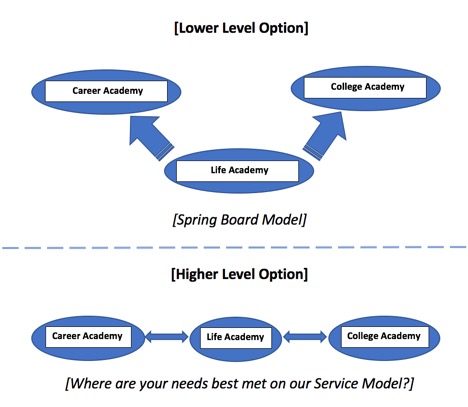Adult Education and Literacy
The SWTJC Adult Education and Literacy Program is a federally funded project (since 1973) that provides adults the opportunity to improve their literacy levels and skills, thereby increasing their ability to function in the complex society and job market of the 21st Century. The project operates an 11 county region that includes Dimmit, Edwards, Frio, Kinney, La Salle, Maverick, Medina, Real, Val Verde, Uvalde, and Zavala counties.Enrollment Protocol As We Begin to Turn the Page on COVID-19
SWTJC-AEL anticipates a return to normal as we turn the page on the pandemic. That is, a switch back to in-person services with more relaxed procedures, especially for vaccinated individuals. For example, mask requirements are optional however, encouraged in close proximity or crowded indoor gatherings.
Students living in remote areas with no AEL service center presents maintain the option for virtual/online registration procedures and virtual (remote) instruction. Prospective participants should engage with the nearest Contact Center in order to schedule face-to-face and/or online appointments with AEL personnel:
Contact Centers:
Crystal City – (830) 374-2828
sescamilla@swtjc.edu
Del Rio – (830) 703-1586 or (830) 703-1572
adbrooks@swtjc.edu
Eagle Pass – (830) 752-1761
dcalvarado@swtjc.edu
Hondo – (830) 584-7027 or (830) 426-2018
dmperez@swtjc.edu
Uvalde – (830) 278-4391 or (830) 278-5208
dmperez@swtjc.edu
Main Office – (830) 591-7385
ael@swtjc.edu
New Student Orientation (NSO): [for students in remote areas with no AEL service center presence]
- Face-to-Face option for NSO is available by appointment to minimize traffic or;
- Schedule/Conduct online NSO via Teams/Zoom (blank documents shared or emailed)
- Program POC (Point of Contact) information is shared (phone #s, best times to call, emails, webpage, social media, etc.)
- SEF (Student Enrollment Form) is filled out over the phone
- Student submits (via encrypted email; dropbox; mailed in) required eligibility documentation to local sites
Remote Testing Option: [remains for students in remote areas with no AEL service center presence]
- Face-to-Face baseline/post option is available by appointment or;
- Regional Assessor’s who have undergone training can opt. to remote test
- TABE 11/12 Pre/Post Remote testing (as available for 18+ yr. olds)
- BEST Plus Pre/Post Remote testing (for 18+ yr. olds)
Instructional Delivery:
- Face-to-Face instruction is encouraged and/or a combination hybrid approach realizes optimal student outcomes
- Yet, remote services are available for students in remote areas with no AEL service center presence
TXCHSE: [OnVue a.k.a. online proctored GED testing]
- In-person GED exams are available through the SWTJC-Uvalde Testing Center
- Online GED Testing continues contingent on meeting criteria (from home or an AEL service center)
- GED exam vouchers are available to qualifying individuals
What is Adult Education and Literacy?
How Do Adults Participate in Adult Education and Literacy?
There are several qualifications an individual must meet in order to be eligible to participate in an adult education class. He/she must be at least 17 years of age (16 if
SWTJC-AEL Prime Objective:
Transition to Higher Ed.; Training; and/or the Workforce.
What’s your Why?
I want to learn English. Why? - to get a job. = Career Academy
I want to get my GED. Why? – to enroll in college. = College Academy
I want to learn English. Why? – to get my Citizenship. – Life Academy
Because we are your How.

